The Montreal Canadiens. The Arizona Coyotes. The Chicago Blackhawks. The Columbus Blue Jackets. The New York Rangers. The Minnesota Wild. The Dallas Stars. The St. Louis Blues. The Philadelphia Flyers. The Pittsburgh Penguins. The Edmonton Oilers. The Calgary Flames. The New York Islanders. The San Jose Sharks. The Vancouver Canucks. The Los Angeles Kings. The New Jersey Devils. The Vegas Golden Knights.
This is the list of teams involved in at least one trade since the Vegas Golden Knights announced their expansion draft roster last Wednesday night. Eighteen teams–more than half the league–made a move they thought would make their team better. Of those, ten made the playoffs last year. In other words, two-thirds of the teams that were good enough to make the postseason in 2016-17 made a move that they believe made them even better–adding scoring, skill, toughness, defense, goaltending or opening salary cap space.
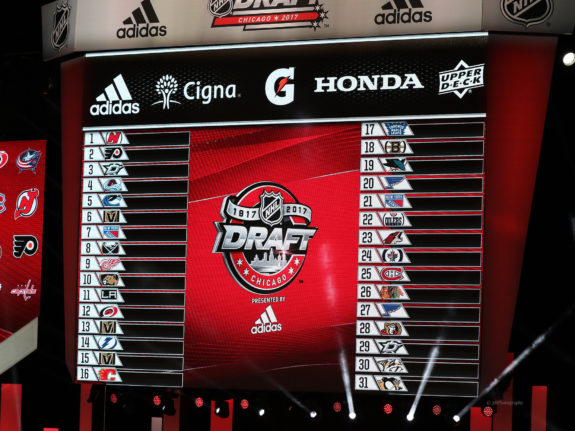
The Sabres were one of only thirteen teams that didn’t make a move this weekend at the NHL Entry Draft in Chicago. They made their six picks and left the Windy City. Of the fourteen teams that did not make the playoffs, seven made a move to improve their team.
Patience is a Tough Sell
Last season, a lot of Sabres fans seemed justifiably restless. They yearned and almost expected to visit the postseason. Instead of building off their 27-point improvement in 2015-16, they imploded down the stretch this season, finishing last in the Atlantic Division and missing the playoffs – their big goal – by a whopping 17 points. Though it had its share of highlights, it felt like a lost season by December, even with Jack Eichel back in the lineup. While it likely won’t get worse next season, it may not get that much better either.
The Sabres’ general manager and the coaching staff may have turned over, but one thing hasn’t changed; this team still has some immediate needs to fill. There is a glaring need for top four defensemen in addition to a need for depth at every other position.
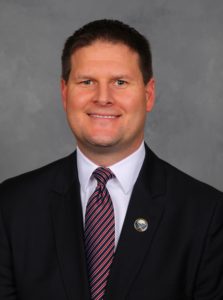
General manager Jason Botterill is known for taking a methodical approach. It’s a calculated way to build a roster, but it takes years to stock, develop and maintain a good pool of NHL prospects. That may not please anxious fans who demand to see signs of progress.
No team makes a move just for the sake of making one. They have to see the transaction as adding value, either short- or long-term. But for fans of a franchise like the Sabres, one that’s missed the postseason six straight years and hasn’t won a playoff series in ten seasons, it’s a little disconcerting to not have anything shake down at the draft.
Botterill’s Decisions
By stats alone, several of Botterill’s draft picks were puzzling.
His decision, in the third round, to go rogue by choosing a player that not one hockey expert ranked in the Top 150 is head-scratching. A player not listed, or listed so low, on the evaluation boards would have been available at any time. Instead, at that point, he could’ve selected David Farrance, a much higher-rated prospect from nearby Rochester.
Also, in a league that’s bigger, faster and stronger, many of the players Buffalo selected in the draft are undersized. Talent is talent, but how many teams can be comprised of 5-foot-9 players? Tyler Ennis gets knocked down on every shift. Of the six selections, three are undersized with draft notes that mention their small frames.
Sabres’ Draft Picks
Aside from the very top picks in the first round, predicting how prospects will perform in the NHL is nearly impossible. Players are taken so young require several years to develop. For now, all one can look at are statistics and rely on scouts’ professional opinions.
Casey Mittelstadt
In the first round, the Sabres snagged Casey Mittelstadt. He’s likely a year or two away from wearing blue and gold. The highly rated pick was a disaster at the combine, unable to perform one chin-up, having the worst VO2 max and only able to bench press once. A little time in the weight room should help that.
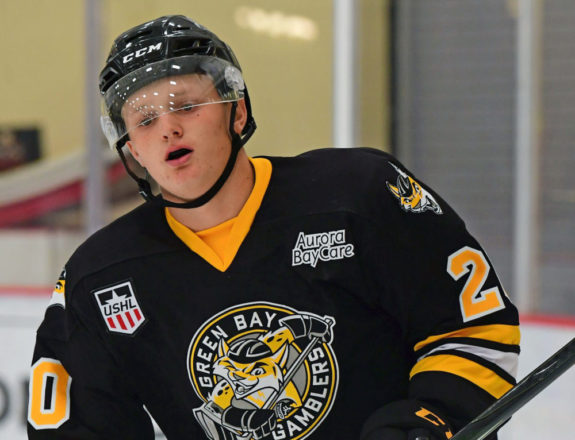
Marcus Davidsson
In the second round, the Sabres chose Marcus Davidsson from Sweden. The 6-foot, 191-pound center won a championship with his junior club in 2015-16 and was named playoff MVP. He was ranked 12th among European skaters by NHL Central Scouting.
Ukka-Pekka Luukkonen
Buffalo’s other second-round pick, 6-foot-4 Ukka-Pekka Luukkonen of Finland, was the top-ranked European goalie prospect, according to NHL Central Scouting. He led his junior team to the league championship and backstopped Finland to the gold medal in the 2016 under-18 world championship, where he was named to the all-tournament team. He followed that up with a silver at this year’s under-18 tournament.
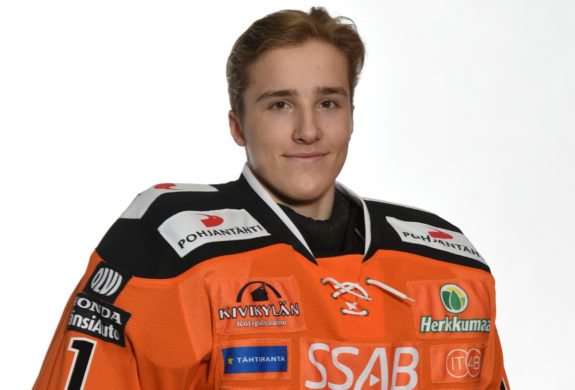
He’s a great pick, especially since Cal Petersen will likely pull a Jimmy Vesey and become an unrestricted free agent. The Sabres have all but lost hope they can sign the former goalie for the Fighting Irish.
Oskari Laaksonen
In the third round, the Sabres took a flier on a Oskari Laaksonen, a defenseman from Finland. He didn’t even show up on Central Scouting’s list of top skaters. The 6-foot, 154-pounder was highly touted by the Sabres European scouts the last two years. It left many fans wondering, saying ‘here we go again.’
Jacob Bryson
In the fourth round, the Sabres selected 5-foot-9, 175-pound Jacob Bryson, a freshman at Providence College freshman. Ironically, he was the defense partner of Anthony Florentino, Buffalo’s fifth-round pick in 2013.
Linus Weissbach
In the seventh-round, the Sabres went with Linus Weissbach, a left winger for Tri-City of the United States Hockey League. The native of Sweden came to North America this year and had 19 goals and 47 points in 49 games for Tri-City. He is scheduled to attend the University of Wisconsin.
Building a Contender
With none of the five players drafted, including first-rounder Casey Mittelstadt, unlikely to be in the lineup next year, the next obvious place to look for help is free agency. This year’s list has some options but is underwhelming.
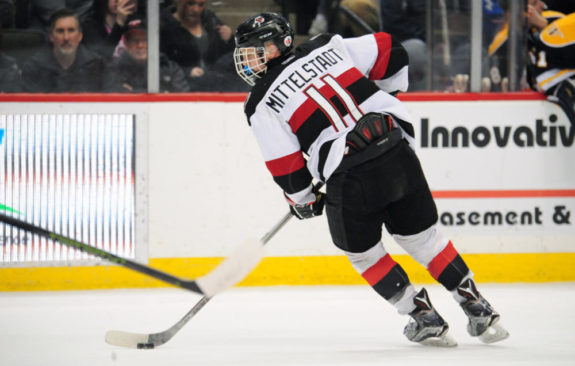
Making this team a contender is not something that’s going to happen overnight. But one would’ve hoped the last days in Chicago could have provided a quicker path forward. Time will tell if Botterill and the Sabres made the right choices by standing pat with his six picks.